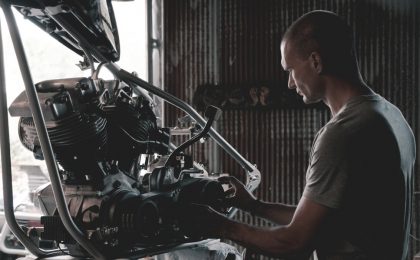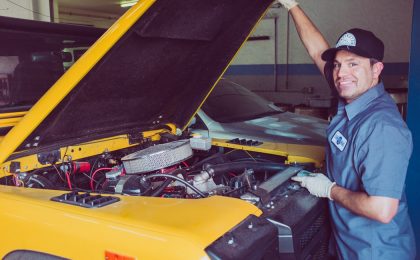You deal with insurance all the time. Just not Auto Mechanic Insurance.
If you’re an auto mechanic, you probably deal with insurance companies on a regular basis. You may repair cars or trucks after an accident and bill them as a regular part of what you do.
But even if you talk to an adjuster or someone at an insurance agency on a regular basis, you may not really know anything at all about the most important policy you come into contact with – the one that protects your auto mechanic business itself.

But how hard can it be? It’s the same as pretty much any other policy, right? And since this is an honest guide, I’m probably just going to tell you that you don’t need that much insurance anyway! Right? Right?!
Wrong.
Business insurance can do things like help you repair a company vehicle you own if you bump into a wall, or if your new employee accidentally puts a hole in the wall. It can absolutely do that.
But the REAL reason anyone has business insurance is so that they can be protected from those huge things that can put you out of business or, even worse bankrupt you personally.
Once I have explained the coverages to you it is easier to see how something big happening could end up costing your auto body shop a fortune to repair – if you didn’t have enough insurance, or what we call underinsured.
I will also help explain some of the language of auto mechanic insurance so that if you are talking to an agent or adjuster, you will know what they mean when they say something like, “No, that’s Garagekeepers, not your GL.”
After all, you’d probably give me some help if I said, “I think something’s wrong with my suspension. Maybe it’s my spark plug?” (If my car even still has them!)
So let’s see what auto mechanic insurance actually does and how it can save you from a whole lot of trouble.

The Basic Garage Coverages
There are certain things in your policy that nearly every business has, but with an auto mechanic twist – what I call The Garage Basics. Let’s check them all out and see how auto mechanic insurance – or what we call Garage Coverage – works for you.
Business Property Insurance – Covers your buildings and personal belongings (like tools and machinery) that make up what you think of when you think, “my business.” THIS IS YOUR STUFF.
Without this fire or theft or a whole bunch of things could put a serious dent in your ability to operate. There is a distinction between your business property, such as your building and secondary buildings, and your personal property, such as your equipment and furniture.
The solid permanent structures are the property, while anything you can get up and carry off is personal property – even if it takes a forklift.
General Liability Insurance – Covers you from risk you may be liable for as a result of running a business. If someone slips and falls on your oil-slick floor and sues you, this is the coverage that helps. THIS PROTECTS WHAT YOU DO TO OTHERS.
General liability, or GL as it is often called, is one of the most important pieces of protection any business can have, but especially for mechanics. As the people responsible for maintaining the cars and trucks that keep America running, you put yourselves out there everyday – and anyone can sue anyone for anything. Make sure you’re protected.
Garage Liability Insurance – A GL does a lot, but an auto mechanic has specific risks that need to be defended against. The garage liability coverage protects a mechanic owner in two ways. THIS PROTECTS WHAT YOU DO TO OTHERS IF YOU HAVE A CUSTOMER’S CAR.
First, it protects them from being liable for the vehicles that they are working on and housing – IF the vehicle’s owner does not have liability coverage of their own on the car or truck. Second, it provides protection for any liability arising out of garage operations.
This can protect from a huge list of things that can happen, but the most common is test driving a vehicle to make sure the repairs worked and getting into a wreck that you or an employee are responsible for. The garage liability coverage would pay for damages that your shop would be responsible for.
Garagekeepers Insurance – Your garage liability coverage does not cover the damage to vehicles that you own or are in possession of while working on them – but Garagekeepers does for the non-owned vehicles. THIS PROTECTS THE VEHICLES YOU HAVE PHYSICALLY.
This coverage makes sure that damage to the body of the cars or trucks themselves is covered, what we call physical damage coverage. In the above example, if your employee has a wreck in a car you repaired but no one else is involved, garagekeepers coverage would pay for the damage to the vehicle.
NOTE: Vehicles you own should be covered on a separate Business Auto policy.

What you actually need.
Now you’ve got the info. But let’s see what you ACTUALLY need. After all, we said this was honest, right?
The first thing is to make sure that your Business Personal Property insurance is for an accurate amount. Cover the building to the full amount that it would cost to replace it, what we creatively call replacement cost. While this seems like a no-brainer, people regularly try and save money by underinsuring their buildings.This could land you in serious trouble.
Not only could you be out whatever amount you are under the replacement cost value after a total loss, but some policies have what is called a coinsurance clause.
Coinsurance in business insurance is different from health insurance. In business property insurance, a coinsurance clause means that whatever percentage of the total value of your property is insured, that is the percentage of a claim that is paid.Wait, what? Let me give an example.
If your building and personal property are worth $100,000, but you insure them both for only $80,000, then you are only 80% covered. If you have a claim, that claim will only be paid to 80% of what it actually costs, leaving you on the hook for the remaining 20%.
So it really pays to insure your property fully to avoid pitfalls like this.
Next, get more liability coverage than you think you need. Wait, why would I say that? The reason is that increasing your liability coverage is not that expensive for the amount you get. Most people think more is always more expensive, but going from $500,000 to $1,000,000 usually isn’t twice as expensive, which is what you would expect.
It’s often only a little bit more a year to jump massive amounts of coverage like this. Not only is it affordable, but the price of lawsuits and bodily injury claims have risen dramatically in the past several years. Coverages that made sense ten years ago are now much too small for the current world we live in.
If your employee hits someone while test driving a car and puts someone in the hospital, a single person’s hospital bill can blow right through a $100,000 liability limit – leaving your business responsible for anything after that.
So get more than you think you need, because you don’t want to be in a situation where you are struggling to make ends meet because you saved $50 a year.
Make sure your Garagekeepers is enough to cover all of the vehicles that might be in your possession. That makes sense, right? But many people try to get under this, or underestimate the value that they can have if they get busy.
Consider this: if a tornado cuts through your lot and destroys every vehicle you are working on, does your current policy have enough protection to cover it?
Whatever amount you will have under your care when you are at your busiest is what you should use as your benchmark, not a low-ball number that saves you a couple of bucks here and there but could leave you in serious danger if something terrible happened.
Make sure you have the other policies you need that aren’t specifically covered by your auto mechanic insurance. Things like Workers Comp and Business Auto are necessary if you have five or more employees or vehicles owned by your business.
You may need EPLI insurance if you have many employees and need protection from employee-related lawsuits.
If you have concerns about liability, or are in an especially risky type of auto repair (such as big trucks), consider getting excess liability coverage. And if you don’t know what other policies you need – ASK!
Your agent, or someone here at Alliance, can walk you through the surrounding policies that will make up your complete line or protection, or what we call complete risk management.
Let’s wrap it up.
Hopefully, you’ve gotten a good look under the hood of your auto mechanic insurance. Now you know the basic coverages, what they do, and how you should think about whether you are insured correctly or not.
The main takeaway is that you should insure your property and liability to the full value possible. Not doing so could cost you everything, and the savings you may receive in the meantime are minimal.
And when you consider things like coinsurance or the amount of inventory you have on busy days, the number that your policy needs to say you are covered for may not be what you actually have on your policy.
That being said, we pride ourselves on being educators, not salespeople. If you’re worried that you have coverages you don’t need or are confused about something in particular, please ASK US!
We will never tell someone to get a coverage they don’t need, or to have insurance that won’t help them in case of an accident or claim. Period.
Let’s set up a time to talk. Click the link below to schedule a call with an agent who specializes in Garage Insurance so you can get protected the way you deserve.


